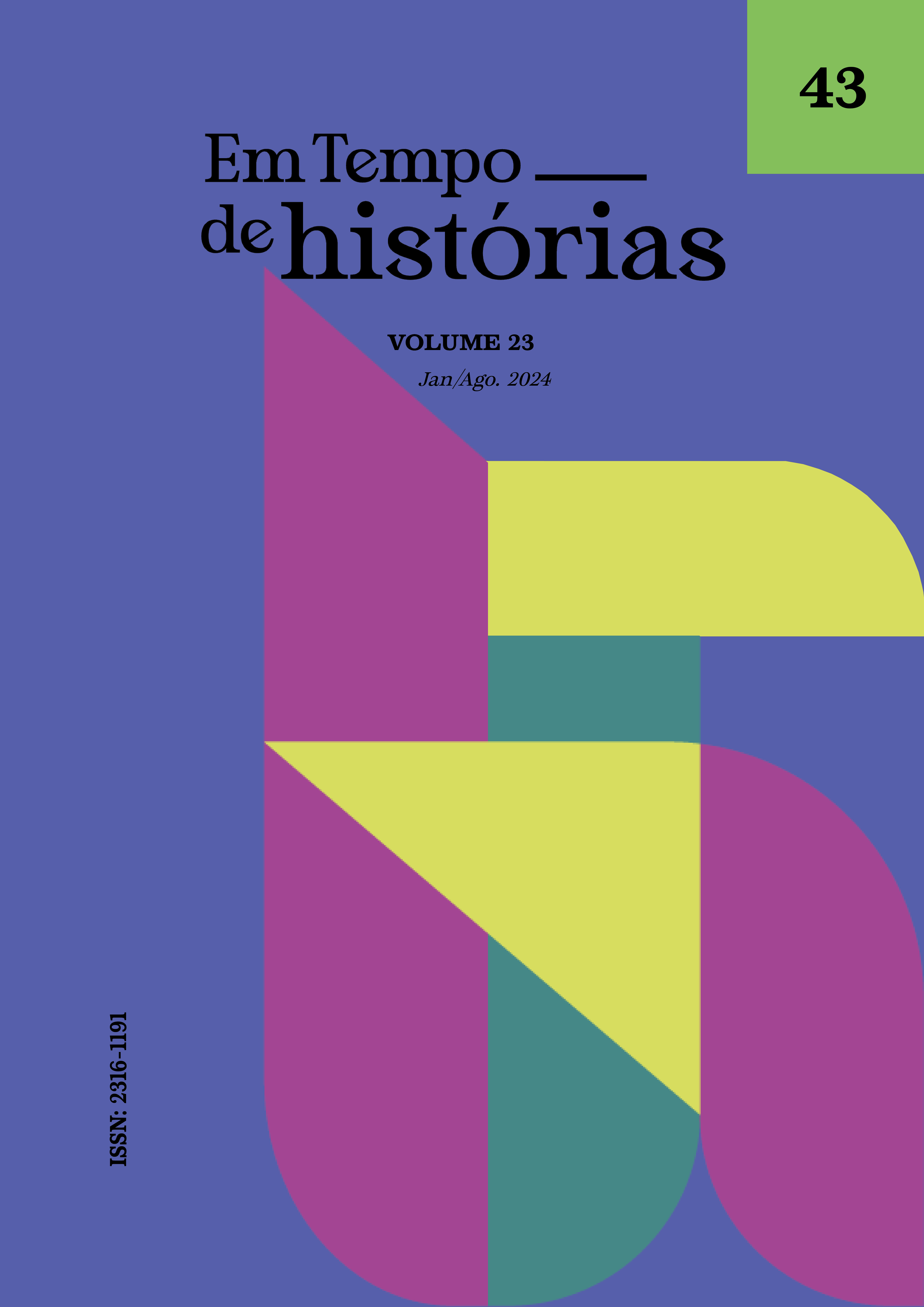Memories of capitalism in Hayao Miyazaki’s works: a debate based on “Nausicaä of the Valley of the Wind” (1984) and “Princess Mononoke” (1999)
DOI:
https://doi.org/10.26512/emtempos.v23i43.53160Keywords:
Japanese animation, Anthropocene, Memories of capitalismAbstract
The director of animated films, Hayao Miyazaki, is a significant figure in works that invite the viewer to critically consider essential societal issues. In this vein, Nausicaä of the Valley of the Wind and The Princess Mononoke are two important cinematic works that offer critical possibilities for thinking about the Anthropocene and Capitalocene, Nature, and the memories of capitalism. Through narratives that involve both human and more-than-human relationships, and by transcending the classic dichotomies found in children’s movies, Miyazaki exposes intricacies that this paper aims to explore regarding the use of memories and testimonies. With these two films as a starting point, we aspire to engage in discussions about human relations with other forms of life and other beings, thereby demonstrating ways to engage a memory of capitalism from these perspectives.
Downloads
References
A Princesa Mononoke. Direção: Hayao Miyazaki. Produção: Toshio Suzuki. Tóquio: Studio Ghibli, 1997, 133min, son. color. Legendado. (Animação).
CASEY, Edward. Remembering: a Phenomenological Study. 2. ed. Bloomington: Indiana University Press, 2000. (Studies in Continental Thought).
DARDOT, Piere; LAVAL, Christian. A nova razão do mundo: Ensaio sobre a sociedade neoliberal. Tradução: Mariana Echalar. 1. ed. São Paulo: Boitempo Editorial, 2016.
DEMPSTER, Beth. Sympoietic and autopoietic systems: A new distinction for self-organizing systems. Proceedings of the World Congress of the Systems Sciences and ISSS, 1–18, 2000. Disponível em: <https://citeseerx.ist.psu.edu/cument?repid=rep1&type=pdf&doi=44299317a20afcd33b0a11d3b2bf4fc196088d45>. Acesso em: 30 de maio de 2024.
DESPRET, Vinciane. From secret agents to interagency. History and Theory, n. 52, p. 29-44, dez. 2013.
DONSOMSAKULKIJ, Weeraya. Spirited Away: Negotiation between Capitalism and Reminiscent Environmental Ethics. Resilience: A Journal of the Environmental Humanities. v. 2, n. 3, 2015. Disponível em: <https://muse.jhu.edu/article/614507>. Acesso em: 23 de fev. 2024.
FRASER, Nancy. Cannibal Capitalism: How Our System Is Devouring Democracy, Care, an the Planet - and What We Can Do about It. 1. ed. Londres: Verso Books, 2022.
______, Nancy; JAEGGI, Rahel. Capitalismo em debate: um conversa na teoria crítica. Tradução: Nathalie Bressiani. 1. ed. São Paulo: Boitempo Editorial, 2020.
GATTI, Gabriel; MARTÍNEZ, María. El ciudadano-víctima. Notas para iniciar un debate. Revista de Estudios Sociales, [s. l.], v. 59, p. 8–13, 2017.
HARAWAY, Donna Jeanne. Staying with the Trouble: Making Kin in the Chthulucene. 1. ed. Durham and London: Duke University Press, 2016.
______. Ficar com o problema: Antropoceno, Capitaloceno, Chthuluceno. In:
Antropoceno ou Capitaloceno? Natureza, história e a crise do capitalismo. Tradução: Antônio Xerxenesky & Fernando Silva e Silva. 1. ed. São Paulo: Elefante, 2022. p. 66-125.
JELIN, Elizabeth. Los trabajos de la memoria. [S. l.]: Siglo XXI, 2002.
KOPENAWA, Davi; ALBERT, Bruce. A queda do céu: Palavras de um xamã yanomami. 1. ed. São Paulo: Companhia das Letras, 2015.
LE GUIN, Ursula K. A Autora das Sementes de Acácia e Outras Passagens da Revista da Associação de Therolinguística. 7˚ edição do Festival Kino Beat 2021. Tradução: Gabriel Cevallos e Fernando Silva e Silva. 202 1 [1988]. Disponível em:
<https://kinobeat.com/wp-content/uploads/2021/09/Traducao-oficial-A-autora-dassementes-de-acacia-.pdf> Acesso em: 25 de maio 2024.
MOORE, Jason W. Capitalism in the Web of Life: Ecology and the Accumulation of Capital. 1. ed. New York: Verso Books, 2015.
______, Jason W. O surgimento da Natureza Barata. In: MOORE, J. W. (org.). Antropoceno ou Capitaloceno? Natureza, história e a crise do capitalismo. Tradução: Antônio Xerxenesky & Fernando Silva e Silva. 1. ed. São Paulo: Elefante, 2022. p.
–186.
MIYAZAKI, Hayao. Starting Point: 1979-1996. 7. ed. San Francisco: VIZ Media, 2021.
______, Hayao. Nausicaä of the Valley of the Wind. 10. ed. San Francisco: VIZ Media, 2022.Nausicaä e o Vale do Vento. Direção: Hayao Miyazaki. Produção: Isao Takahata. [S. I.]: Topcraft, 1984, 117 min, son. color. Legendado. (Animação).
Downloads
Published
How to Cite
Issue
Section
License
Copyright (c) 2024 Em Tempo de Histórias

This work is licensed under a Creative Commons Attribution-NonCommercial 4.0 International License.
Autores que publicam nesta revista concordam com os seguintes termos:
- Autores mantém os direitos autorais e concedem à revista o direito de primeira publicação, sendo o trabalho simultaneamente licenciado sob a Creative Commons Attribution License , licença que permite que outros remixem, adaptem e criem a partir do seu trabalho para fins não comerciais, e embora os novos trabalhos tenham de lhe atribuir o devido crédito e não possam ser usados para fins comerciais, os usuários não têm de licenciar esses trabalhos derivados sob os mesmos termos.
- Autores têm autorização para assumir contratos adicionais separadamente, para distribuição não-exclusiva da versão do trabalho publicada nesta revista (ex.: publicar em repositório institucional ou como capítulo de livro), com reconhecimento de autoria e publicação inicial nesta revista.
- Autores têm permissão e são estimulados a publicar e distribuir seu trabalho online (ex.: em repositórios institucionais ou na sua página pessoal) a qualquer ponto antes ou durante o processo editorial, já que isso pode gerar alterações produtivas, bem como aumentar o impacto e a citação do trabalho publicado (Veja O Efeito do Acesso Livre).













